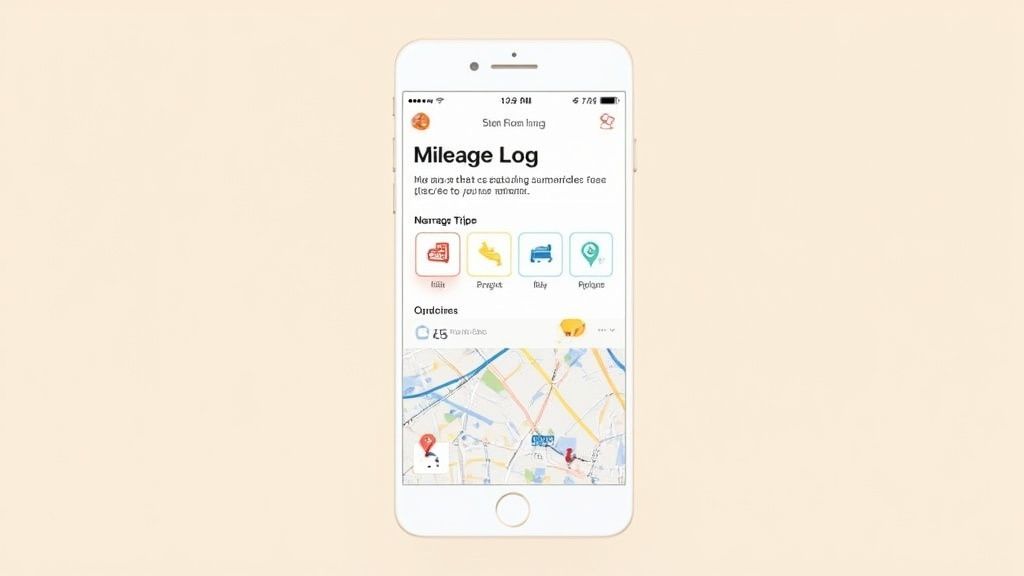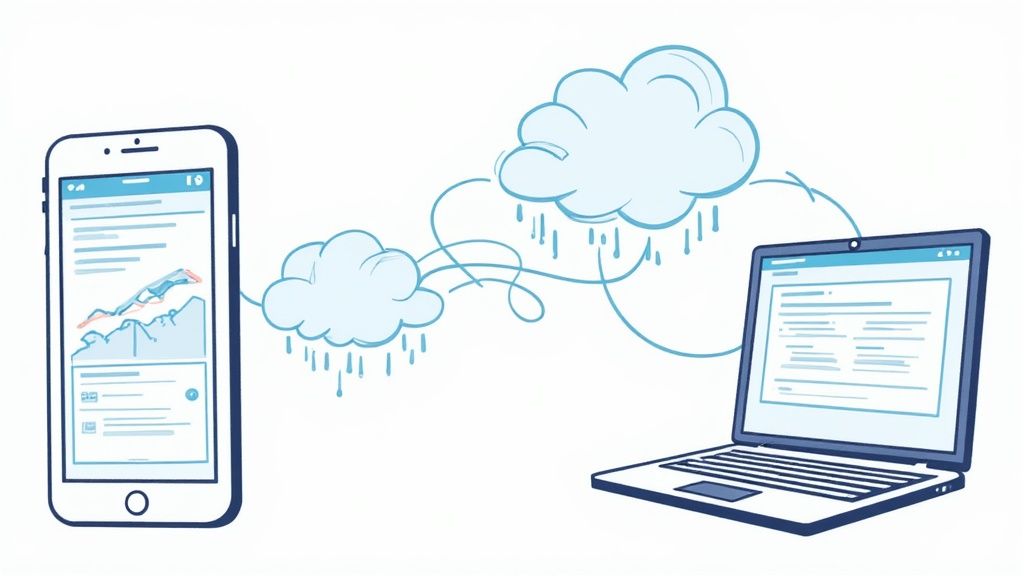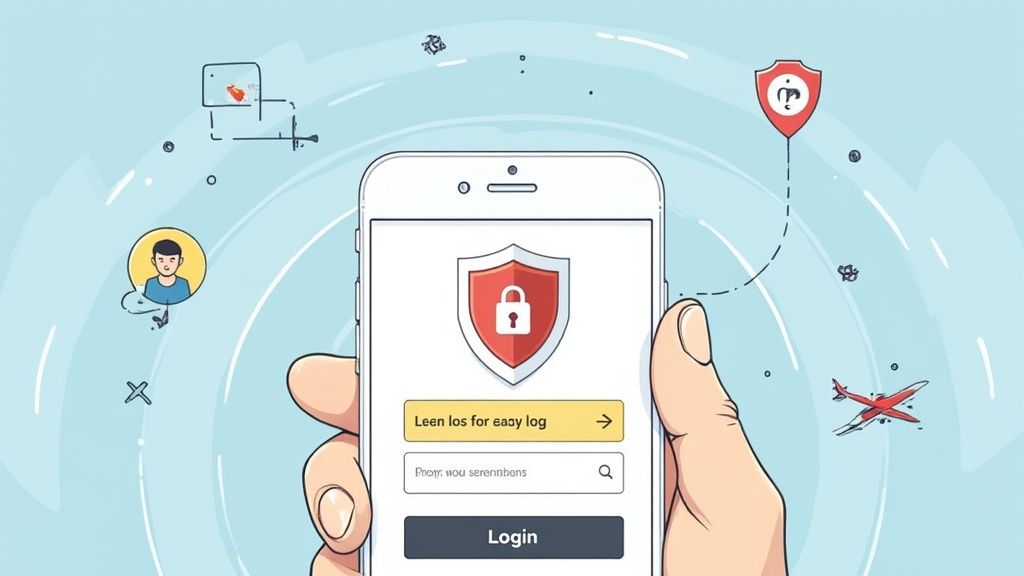
Essential Mileage Log App Guide: Expert Tips to Transform Your Business Tracking
Why Digital Mileage Tracking Is Transforming Business

The days of tedious paper mileage logs filled with errors and missing entries are coming to an end. Businesses are discovering that switching to digital tracking isn’t just more convenient - it’s essential for maximizing tax deductions and managing expenses effectively. A mileage log app provides an elegant solution that addresses the key problems of traditional manual tracking methods.
The Hidden Costs of Manual Logging
Consider how much time your team spends each month reconstructing routes, digging through old receipts, and manually calculating miles driven. This administrative burden adds up quickly, especially for companies with multiple employees on the road. Research shows that using a mileage log app saves an average of 80 hours per year - time that could be spent on growing the business instead. Beyond the time waste, manual logs are prone to costly errors that can lead to missed deductions or trigger unwanted IRS attention.
Unlocking Missed Deductions with a Mileage Log App
Many professionals are discovering thousands in previously unclaimed deductions after switching to digital tracking. A mileage log app creates an automatic record of every trip, ensuring no business miles slip through the cracks. Given the current IRS mileage rate of 67 cents per mile, even small gaps in record-keeping can mean significant lost deductions over time. The precise tracking provided by these apps helps businesses claim their full entitled reimbursements with confidence.
From Guesswork to Precision: The Power of Automation
Digital mileage tracking represents a shift from rough estimates to exact, verified data. For example, apps like MileIQ have tracked over 80 billion miles and enabled more than $10 billion in deductions and reimbursements. This level of precision delivers both financial benefits and enhanced compliance. With detailed digital records of every business trip, companies can easily substantiate their mileage claims during audits. This degree of accuracy would be nearly impossible to achieve with paper logs.
The Future of Business Mileage Tracking
The move to digital mileage tracking is becoming essential for businesses focused on smart operations and growth. A mileage log app reduces administrative work, maximizes tax benefits, and maintains proper documentation - freeing up resources for core business activities. Companies that adopt these tools gain clear advantages in efficiency and financial performance. By embracing digital tracking technology, businesses position themselves to better manage expenses while focusing on what matters most: serving customers and growing revenue.
Finding Your Perfect Mileage Tracking Solution
Choosing the right mileage tracking app requires careful consideration of how it will serve your specific needs. While there are many options available, the key is understanding which features and capabilities matter most for your situation. By evaluating factors like accuracy, battery life, ease of use, and pricing in relation to your requirements, you can find a solution that truly works for you.
Essential Features: What Truly Matters
Different users have different needs when it comes to mileage tracking. A freelancer who drives occasionally may be perfectly served by a basic free app with manual tracking capabilities. On the other hand, a field sales representative covering large territories needs automatic tracking and expense report integration. Similarly, rideshare drivers often benefit from specialized apps like SherpaShare that cater to their unique requirements. The key is matching features to your actual usage patterns.
Accuracy and Battery Life: The Unsung Heroes
Precise mileage tracking is essential since even small discrepancies can add up to significant financial impact over time. Research by The Rideshare Guy found notable variations in accuracy between popular apps, with some undercounting miles substantially. Battery consumption is another critical factor, especially for drivers who spend long hours on the road. Some feature-rich apps drain phone batteries quickly, making them impractical for extended use. Reading reviews and performance tests helps identify apps that balance accuracy and battery efficiency.
Evaluating the True Cost
The real cost of a mileage tracking solution goes beyond the monthly subscription fee. Some apps require manual trip classification, creating extra work that defeats the purpose of automation. Others limit free versions with trip caps that push users toward paid plans. For organizations tracking multiple drivers, per-user pricing can multiply quickly. Understanding your expected usage volume and patterns is crucial for calculating the actual long-term costs.
User Experience and Practicality
While an attractive interface is nice, the true test of an app is how well it works in daily use. Features that sound good in theory may prove frustrating in practice. For example, apps that need frequent manual input can be more hassle than help. Those lacking integration with your accounting software may create extra steps in your workflow. Getting feedback from experienced users about which features they rely on most can reveal what really matters for practical, everyday use.
By carefully considering these aspects in relation to your specific needs, you can select a mileage tracking app that delivers consistent value. The best solution isn’t necessarily the one with the most features - it’s the one that fits your actual usage patterns and provides reliable performance over time.

Mastering Tax Deductions Through Smart Tracking

Getting the most out of business mileage tax deductions starts with keeping good records. A mileage log app makes this crucial task much simpler by automatically tracking your trips while ensuring you follow IRS rules. This allows you to stay focused on running your business, knowing your mileage records are accurate and ready when tax time comes.
Categorizing Trips Efficiently
One of the most helpful features of mileage tracking apps is quick trip classification. Users can easily mark each drive as business or personal with a simple tap. This clear separation is essential for tax reporting and helps prevent audit issues. For example, driving to client meetings counts as business mileage, while personal errands don’t qualify for deductions. Apps like MileIQ can remember your common destinations and automatically sort future trips, making the process even easier.
Handling Mixed-Use Vehicles
For professionals who drive their cars for both work and personal reasons, keeping track of each type of trip separately is key. A mileage log app maintains clear records showing which miles were for business versus personal use. This detailed documentation helps prove to the IRS that you’re claiming only legitimate business miles. With the current IRS rate at 67 cents per mile, having accurate records of business driving can lead to significant tax savings.
Advanced Features for Better Tax Records
Most mileage apps offer useful capabilities beyond basic tracking that help maximize tax benefits. Some connect with accounting software to streamline tax preparation. Others generate detailed reports you can export directly to tax forms. For instance, TripLog works with various accounting tools so you can easily transfer your mileage data. These integrations help reduce errors and make tax filing more straightforward.
Avoiding Common Mistakes and Audit Triggers
Using a mileage tracking app helps prevent the kinds of mistakes that often attract IRS attention. Unlike error-prone manual logs, apps automatically create accurate, complete records. This consistent documentation greatly reduces the risk of raising red flags with the IRS. Some apps even help identify potential issues before you file, letting you fix problems early. Apps like MileIQ have tracked over 80 billion miles and helped users claim more than $10 billion in deductions, showing how effective they are at helping people document mileage properly and get their full tax benefits while following the rules.
Leveraging Advanced Features for Business Growth

A mileage log app does much more than just track miles for tax deductions and reimbursements. Smart business owners are discovering how to use these apps’ advanced capabilities to gain valuable operational insights and make better strategic decisions. Let’s explore how these features can help businesses boost efficiency and growth.
Optimizing Routes and Minimizing Downtime
Modern mileage tracking apps include powerful route optimization tools that help drivers find the most efficient paths between stops. This not only reduces fuel costs and vehicle wear but also allows teams to accomplish more in less time. For example, sales teams can plan client visits strategically to maximize the number of meetings per day while reducing travel time between locations.
Analyzing Client Visit Patterns and Territory Management
The data collected through mileage tracking provides rich insights into client visit patterns and territory coverage. By examining this information, businesses can spot trends and refine their territory strategies. For example, if data shows certain areas require excessive drive time, companies can adjust territory boundaries or explore different service delivery approaches to better serve clients while reducing wasted travel.
Forecasting Expenses and Budgeting Accurately
When combined with current fuel prices, detailed mileage records enable precise expense forecasting. This helps businesses plan their budgets with greater confidence. A delivery company, for instance, can accurately project next quarter’s fuel expenses based on historical mileage data and price trends, allowing for proactive cost management and smarter financial decisions.
Generating Reports for Data-Driven Insights
Quality mileage tracking apps offer comprehensive reporting capabilities that provide detailed views of mobile operations - from total miles driven to time spent on the road. Many apps also connect directly with accounting software for seamless expense reporting and tax preparation. These reports help businesses analyze metrics like cost per client visit or territory profitability, making it easier to spot opportunities for improvement and optimize resource allocation. This data-focused approach leads to smarter decisions about managing and growing a mobile workforce.
Building a Sustainable Tracking System
A mileage log app is much more than just a way to record your trips - it’s the cornerstone of an effective mileage tracking system that fits seamlessly into your business operations. Developing this system takes careful consideration and planning. You’ll need to think beyond just installing an app and consider how the tracking fits into your broader workflow.
Implementing a Mileage Log App Across Your Team
Rolling out a mileage log app to your team requires more than sending out login details. Start with clear, hands-on training that covers the key functions - from setting up the app and classifying trips to creating reports and connecting with other business tools. Make sure to demonstrate proper trip categorization between business and personal use, highlighting why accurate records matter for taxes. Assign a point person for questions and technical support to help maintain consistent usage across the team.
Maintaining Data Integrity and Accuracy
When it comes to mileage tracking, data quality is essential. Set up regular checks to verify the information logged in your app by comparing it against fuel receipts and GPS records. This way, you can quickly catch and fix any discrepancies before they cause issues during tax filing or reimbursement processing. For bigger teams, random spot checks help ensure everyone follows best practices and keeps data clean.
Addressing Common Tracking Challenges
Several hurdles often come up when setting up mileage tracking. A major one is offline tracking, particularly in areas with poor cell coverage. Look for apps that let drivers log miles without an internet connection. Managing multiple drivers sharing vehicles can also be tricky. The solution is to choose an app with easy driver profile switching - TripLog has a multi-driver feature that makes this simple. Finally, create clear steps for reviewing reports, including who approves them and what backup documentation to keep. This helps prevent mistakes and keeps you compliant with company rules and IRS requirements.
Ensuring Long-Term System Success
For your tracking system to last, you need to regularly evaluate and improve it. Ask your team for feedback about how well the app works for them. Their input helps identify areas needing changes to better serve your evolving business needs. Combine this feedback with routine data checks to optimize your tracking process for maximum value. Stay current with app updates and new features that could make tracking more efficient. With active management, your mileage tracking can grow from a basic task into a key tool for business growth and financial planning.
Measuring Success and Maximizing Returns
After implementing a mileage log app, businesses need a clear understanding of how to assess its impact and get the most value from their investment. This involves more than just IRS compliance - it requires analyzing key metrics to determine the actual return on investment from your mileage tracking. By looking at specific areas like time efficiency, data accuracy, and business intelligence, you can turn a basic tracking tool into a valuable asset for improving operations and profitability.
Quantifying Time Savings and Efficiency Gains
The most noticeable benefit of using a mileage log app is how much administrative time it saves. For example, consider a sales team that used to spend several hours weekly logging miles manually. With MileIQ automatically capturing their drives, that time can now go toward revenue-generating work like meeting clients and finding new prospects. This shift makes a real difference - if a sales rep saves just 5 minutes per drive across 10 client visits weekly, that adds up to nearly an hour saved. Over the course of a year, those time savings create major productivity gains.
Improving Accuracy and Reducing Errors
Paper mileage logs are prone to mistakes, from forgotten trips to rough estimates. These inaccuracies can mean missing out on deductions or raising red flags with the IRS. A mileage app prevents these issues by recording exact mileage automatically. Better accuracy not only maximizes tax deductions but also strengthens compliance by providing reliable, verifiable records. This gives businesses confidence in claiming their full entitled deductions without worrying about documentation issues.
Gaining Strategic Business Insights Through Data Analysis
Today’s mileage apps do much more than basic tracking - they provide data that informs strategic business decisions. By examining mileage patterns, companies can spot inefficient routes and better organize territory coverage. The mileage data also helps with expense forecasting when combined with fuel costs. For instance, a field service company analyzing drive times might discover technicians spending too much time traveling between jobs, leading them to adjust scheduling or service areas.
Calculating Your ROI and Optimizing for Future Success
To measure the ROI of your mileage app, look at both clear financial benefits and less tangible advantages. Direct benefits like tax savings and reduced administrative costs are easy to calculate. Other benefits like improved employee satisfaction and less stress from simplified tracking are harder to quantify but still matter. By regularly reviewing your tracking processes and analyzing app data, you can find ways to improve and refine your approach. This ongoing optimization ensures your mileage tracking keeps up with business needs while continuing to provide useful insights and cost savings.
Ready to see how automated mileage tracking can benefit your business? Try Auto Service Logger today and discover how it can simplify your vehicle record-keeping while providing valuable data about your fleet’s performance. Get started with Auto Service Logger: https://autoservicelogger.com/